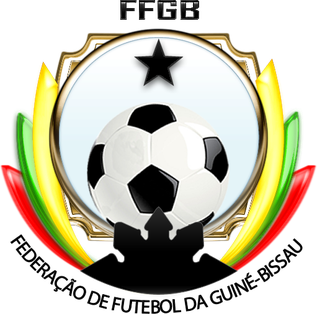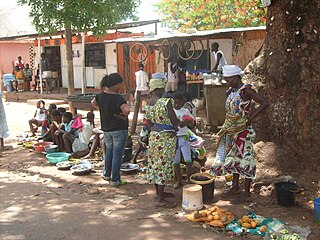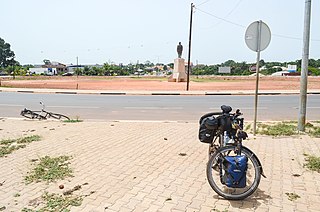Related Research Articles

Guinea-Bissau, officially the Republic of Guinea-Bissau, is a country in West Africa that covers 36,125 square kilometres (13,948 sq mi) with an estimated population of 2,026,778. It borders Senegal to its north and Guinea to its southeast.

The politics of Guinea-Bissau take place in a framework of a semi-presidential representative democratic republic, with a multi-party system, wherein the President is head of state and the Prime Minister is head of government. Executive power is exercised by the government. Legislative power is vested in both the government and the National People's Assembly.
Guinea-Bissau is divided into 8 regions and 1 autonomous sector. The regions are subdivided into a total of 37 sectors ; which are further subdivided into smaller groups called sections ; which are further subdivided into populated places. Here are the following listed below:

The Guinea-Bissau national football team represents Guinea-Bissau in men's international association football and it is controlled by the Football Federation of Guinea-Bissau, The team has never qualified for the FIFA World Cups but qualified for the Africa Cup of Nations four times, making their debut in 2017. The team is a member of both FIFA and Confederation of African Football (CAF).

Quinhamel is a city in Guinea-Bissau and the capital of the Biombo Region. It has a population of 2,887.

Malam Bacai Sanhá was a Guinea-Bissau politician who was President of Guinea-Bissau from 8 September 2009 until his death on 9 January 2012. A member of the African Party for the Independence of Guinea and Cape Verde (PAIGC), Sanhá was President of the National People's Assembly from 1994 to 1999 and then served as acting President of Guinea-Bissau from 14 May 1999, to 17 February 2000, following the ouster of President João Bernardo Vieira. Standing as the PAIGC candidate, he placed second in the 1999–2000 presidential election as well as the 2005 presidential election before winning the June–July 2009 presidential election.
Ansumane Mané was a Bissau-Guinean soldier who led a 1998 uprising against the government of President João Bernardo Vieira, which caused a brief but bloody civil war.

The Football Federation of Guinea-Bissau is the governing body of football in Guinea-Bissau. It was founded in 1974, and affiliated to FIFA and to CAF in 1986. It organizes the national football league and the national team.

Bocundji Cá is a Bissau-Guinean former professional footballer who played as a midfielder. He spent the entirety of his career in France while playing for the Guinea-Bissau national team at international level.

Safim is a city and sector in the Biombo Region of Guinea-Bissau. It has a population of 17,356 inhabitants as of the 2009 national census.

Prábis is a city and an administrative sector in the Biombo Region of Guinea-Bissau. In 2004, it had a population of 12,312.
Jagudis de Biombo is a Guinea-Bissauan football club based in Biombo. They play in the 2 division in Guinean football, the Campeonato Nacional da Guine-Bissau, under the Football Federation of Guinea-Bissau (FFGB).
Ondame is a village in the Biombo Region of Guinea-Bissau.
The sport of football in the country of Guinea-Bissau is run by the Football Federation of Guinea-Bissau. The association administers the national football team, as well as the national league. Association football (soccer) is the most popular sport in the country. Since the Portuguese navigator Nuno Tristão reached the local coast in 1446, but at the latest since the official foundation of the colony Bissau in 1753, the country was a Portuguese colony, and became officially independent only in 1975. To this day, football in Guinea-Bissau is therefore characterized by its Portuguese origins and relationships, for example through a number of affiliates of the Portuguese clubs Sporting CP and Benfica. Also, many Guinea-Bissau footballers play in Portugal.
Papel, or Oium (Moium), is a Bak language of Guinea-Bissau.

The Guinea-Bissau women's national football team represents Guinea-Bissau in international women's football. It is governed by the Football Federation of Guinea-Bissau. It has played in two FIFA-recognised matches, both in 2006 against Guinea. The country also has a national under-17 side which participated in the 2012 Confederation of African Football qualifiers for the FIFA U-17 Women's World Cup. Football is the most popular women's sport in the country. A women's football programme was established in 2004, followed by the creation of a women's national league.
Papels, also known as Moium, Oium, Papei, Pepel or Pelels, are an ethnic group primarily located in Guinea-Bissau, though are also found in Casamance (Senegal) and Guinea. Their population in Guinea-Bissau is about 183,000, with 9,000 living outside of the country. They traditionally engaged in hunting and agriculture.
North is a province in Guinea-Bissau. It consists Biombo, Cacheu and Oio regions.
The Guinea-Bissau women's national football team is the representative women's association football team of Guinea-Bissau. Its governing body is the Football Federation of Guinea-Bissau (FFGB) and it competes as a member of the Confederation of African Football (CAF).
References
- ↑ "Guinea Bissau 2003/04". www.rsssf.org. Retrieved 4 July 2024.